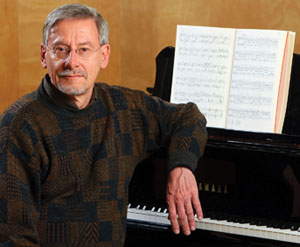 |
| University Research Professor David Schroeder. (Nick Pearce Photo) |
When composer Franz Schubert died in 1828, he and his music were unknown outside a small circle of his friends in Vienna. Just months previous to his death at the age of 31, he enjoyed the one and only public concert of his music.
Fame and recognition came to Schubert slowly over the next two centuries.
Musicologist David Schroeder, a classically trained singer, first sang Schubert songs as a teenager, but it’s only now that he’s in his sixties that he feels wise enough to write about the musical genius whom Beethoven referred to as having “the divine spark.” Dr. Schroeder’s book Our Schubert: His Enduring Legacy has recently been published by Scarecrow Press.
The “our” of the title is significant
In the book, Dr. Schroeder examines the composer’s life and times as well as his effect on other artists and his treatment in literature and film. Throughout his own life, Dr. Schroeder says he developed a deep attachment to the composer and responds to his music in an intensely personal way.
|
“Schubert engages very creative minds,” says Dr. Schroeder, University Research Professor at Dalhousie, who has also written about Austrian composer Joseph Haydn (Haydn and the Enlightenment: The Late Symphonies and their Audience) and Wolfgang Amadeus Mozart (Mozart in Revolt: Strategies of Resistance, Mischief and Deception).
“Schubert makes you feel when you’re listening to his music that you’re involved—as if you’re there as a performer. You get the sense that you’re playing right along with him.”
Dr. Schroeder will have more time for listening now that he’s retiring from teaching. A professor at Dalhousie since 1981, he’s looking forward to switching gears by assisting in a development project in Africa. He is the chair of the board for Wadeng Wings of Hope, a Canadian registered charitable society dedicated to raising funds and implementing projects in support of children’s education in southern Sudan. The founder of Wadeng Wings of Hope is Jacob Deng, one of Sudan’s “lost boys,” who came to live in Nova Scotia as a refugee in 2003.
“I’m not going into this with a definite plan,” remarks Dr. Schroeder, with a smile that says he’s open to serendipity. “It’s all a little woolly at the moment.”
He’s leaving the Department of Music at a high point: the new master’s of musicology program has just got off the ground in September; there’s young blood among the faculty; and the students are as interesting and as lively as ever.
A lecture series, started in complement to the master’s program, made its debut in October; Dr. Schroeder himself kicked it off with a lecture in which he discussed the use of pianos “as instruments of seduction” in the films of Alfred Hitchcock. His colleagues ended up surprising him by naming the series in his honor, the David Schroeder Music & Culture Series.
“You normally have to be dead for that kind of honor,” he laughs. “It’s such an extraordinary gift from my colleagues.”
